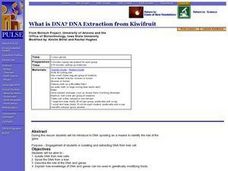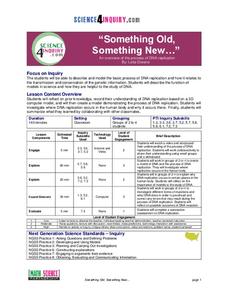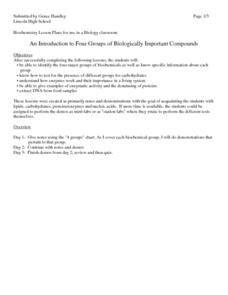Curated OER
Recombinant DNA to Protect Crops
Students read an article about manipulation of plant DNA. After reading the short article, they work in small groups to respond to the provided discussion questions and explain their answer to the class.
Curated OER
Extract Your Own DNA from Cheek Cells
Students observe their own DNA. For this DNA lesson, students learn the simple method of DNA extraction and explain why DNA extraction is important to scientists.
Curated OER
Strawberry DNA extraction
Students study the basic function of DNA and then extract it from strawberries. In this DNA extraction lesson students examine DNA and see why the extraction of it is so important to scientists.
Curated OER
What is DNA? DNA Extraction from Kiwifruit
Students isolate DNA from kiwi cells, spool DNA from a kiwi, describe role of the DNA and genes, and explain how knowledge of DNA and genes can be used in genetically modifying foods.
Curated OER
The Structure of DNA
Students will demonstrate knowledge of the structure of DNA by constructing simple models of DNA with materials given to them in class. They will also discover that some female scientists such as Rosalind Franklin have not been given...
Curated OER
The Case of Regulation in Cells
After your biologists have learned about transcription, translation, and gene regulation, they work in a small group to create a poster of a system that serves as an analogy of the gene regulation process. They share their creations with...
Beyond Benign
Who’s Your Daddy? Finding the Father
Time for the reveal! The nineth lesson plan of the series of 18 has scholars compare DNA fingerprints of cats to their samples to identify the father of Sparky's kittens from previous lessons. They analyze the DNA bands to determine the...
Science 4 Inquiry
"Something Old, Something New..."
Young scientists learn about DNA replication through a video and model creation. They answer analysis questions before exploring the role of mutations and then complete a summative assessment.
LABScI
Taxonomy: Who is in My family?
Find similarities in seemingly unlike organisms. The second instructional activity in a series of 12 builds the concept of a taxonomy and explores the use of a dichotomous key. Learners begin in part one by attempting to group a set of...
Curated OER
Games and Activities to Teach Molecular Genetics
High schoolers demonstrate a working knowledge of cell interactions such as DNA replication, protein synthesis (transcription and translation), through active participation in a cooperative group.
Curated OER
Cracking the Genetic Code
Students investigate different purposes for manipulating DNA. After reviewing the structure and functions of DNA, students explore topics related to the use or manipulation of DNA and the potential benefits and problems, later making a...
Curated OER
Standard 4 Review Sheet-Key Ideas Biology-The Living Environment
In this living environment worksheet, learners answer a variety of questions about living organisms, the processes they go through to make food and break down food, absorb nutrients, and release toxins. They explain homeostasis, they...
Curated OER
An Introduction to Four Groups of Biologically Important Compounds
Students learn about the four biochemicals that are important biologically. In this biochemicals lesson plan, students identify the four major groups of biochemicals including carbohydrates, proteins, lipids and nucleic acids. They are...
Curated OER
DNA and RNA
Tenth graders research the history and discovery of DNA. Using their text, they label a basic DNA structure and the composition of genes. They explain how RNA and DNA differ from one other and discuss the processes of transcription and...
Curated OER
DNA Isolation from Onion
Students apply measurement skills using the metric system. They explain the process of isolating DNA from other cell contents. They apply knowledge of cell structure to explain the process of isolating DNA.
Curated OER
DNA Replication
Pupils construct a 3-D model of DNA. They demonstrate an awareness of base pairs in written work and in a model. Students model DNA replication using edible materials. They record concluding thoughts in their science notebooks.
Curated OER
DNA Fingerprinting with Restriction Enzymes
Students will illustrate how restriction enzymes work by piecing together parts of a puzzle. Then they apply this knowledge to help them analyze genetic evidence from the scene of a crime as well as to help them comprehend how a DNA...
Curated OER
Cloning of Plasmid and Spinach DNA
Students ligate fragments of genomic DNA from spinach into a vector plasmid. They perform a restriction enzyme digestion. Student use a ligated DNA molecule to transform E. coli cells. Students analyze their procedures and outcome of...
Curated OER
DNA Recombination II
Students model recombination in DNA. They color the DNA sample and cut it out. Students use their "restriction enzymes" to cut the DNA into specific fragments. They separate the fragments using the "gel electrotrophoresis." Students...
Curated OER
DNA Replication
Young scholars work with a partner to answer any unanswer questions on their review sheet. They work in groups of 4 to make flash cards as study aides. Students play a review game for the remaining of the class period. The winning...
Curated OER
The Cloning of Plasmid and Spinach DNA
Students will first extract genomic DNA from spinach and perform a restriction enzyme digestion on both the spinach DNA and the plasmid using the same restriction enzyme. They then ligate the cut plasmid DNA with the cut spinach DNA in...
Curated OER
Who Done It?
Pick and choose which activities to include in this crime scene investigation. Junior detectives can examine fingerprints, DNA, blood samples, or bone structure. The plan suggests you have teams solve a mystery, but it does not...
Curated OER
Constructing a Phylogenetic Tree
Students are given the opportunity to analyze DNA sequence differences between organisms in order to establish a reasonable picture of the evolutionary relationships between them (Phylogenetic Tree). In the simulation form they are...
Curated OER
Electrophoresis Analogy
Students participate in a simulation of electrophoresis separation of DNA fragments. They link arms to form DNA fragments with each student representing a nucleotide. As they move through an obstacle course they discover how fragments...

























